What are the Duties of a Speaker? (GS Paper 2, Polity)

Context
- The President has appointed seven-time MP Bhartruhari Mahtab as the ‘Speaker pro tem’ of the 18th Lok Sabha.
- This appointment raises important questions about the duties and roles of the Speaker in the Lok Sabha, which are crucial for the functioning of the Indian parliamentary system.
Who is Speaker pro tem?
- Article 94 of the Constitution ensures that the Speaker of the Lok Sabha does not vacate office until the first meeting of the newly elected Lok Sabha after its dissolution.
- This provision ensures the continuity of the Speaker's office. Consequently, Om Birla, the Speaker of the 17th Lok Sabha, continues in his role until June 24, the scheduled date for the first meeting of the 18th Lok Sabha.
- Article 95(1) of the Constitution states that when both the Speaker and Deputy Speaker positions are vacant, the President appoints a member of the Lok Sabha to perform the duties of the Speaker.
- This situation typically arises when a new Lok Sabha first convenes.
- The term 'Speaker pro tem' means 'for the time being' or 'temporary,' though this term is not found in the Constitution or the rules of Lok Sabha but in the 'Handbook on the working of Ministry of Parliamentary affairs.'
- Traditionally, one of the senior-most members of the Lok Sabha is selected as Speaker pro tem, who is then administered the oath by the President.
- The Speaker pro tem's primary responsibilities include administering the oath of office to other MPs and presiding over the election of the full-time Speaker.
How are the Speaker and Deputy Speaker elected?
- Article 93 of the Constitution mandates that the Lok Sabha shall elect two members as Speaker and Deputy Speaker.
- The election of the Speaker is held on a date fixed by the President and historically, all Speakers have been elected unopposed.
- The election of the Deputy Speaker is held on a date fixed by the Speaker.
What is the role of the Speaker?
- Beyond conducting business in the Lok Sabha, the Speaker has two important constitutional functions:
- Certifying a Bill as a Money Bill, which limits the Rajya Sabha's role.
- Deciding on disqualification of members under the Tenth Schedule concerning defection.
- The Speaker also has powers under the Lok Sabha rules, including referring Bills to Standing Committees and suspending members for grave disorder for up to five days.
- However, the referral of Bills to committees has declined from 71% during 2009-14 to 16% during 2019-24.
- With a coalition government returning, it is expected that the Speaker would refer important Bills to Standing Committees for thorough scrutiny.
- Moreover, the large-scale suspensions of Opposition MPs during the winter session of 2023 have been contentious, as such suspensions can affect the robust functioning of Parliament and should be handled with restraint.
What are the conventions?
- In Britain, once elected, the Speaker resigns from their political party and seeks re-election as 'The Speaker seeking re-election' to reflect impartiality.
- While the Tenth Schedule allows an Indian Speaker to resign from their political party upon election, no Speaker has done so to date.
- Resigning from their political parties could be a significant step towards demonstrating independence.
- The Deputy Speaker steps in during the vacancy or absence of the Speaker.
- The convention of offering the post of Deputy Speaker to the Opposition began in 1991 and continued until the 16th Lok Sabha without interruption.
Conclusion
- The absence of a Deputy Speaker in the 17th Lok Sabha was a constitutional anomaly.
- Reviving the healthy convention of appointing a Deputy Speaker from the Opposition is essential for the current Lok Sabha to function effectively and uphold democratic principles.


